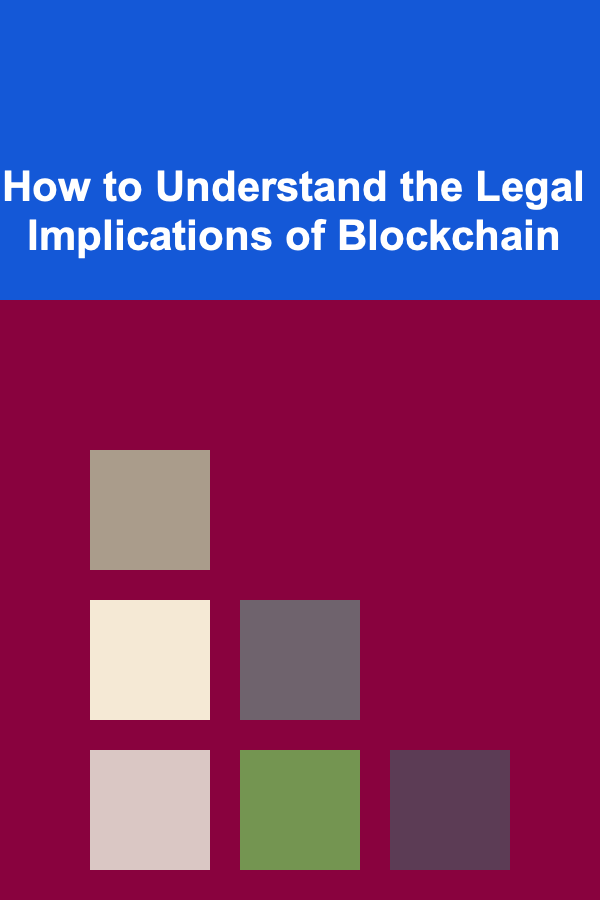
How to Understand the Legal Implications of Blockchain
ebook include PDF & Audio bundle (Micro Guide)
$12.99$5.99
Limited Time Offer! Order within the next:

Blockchain technology, originally introduced as the foundation for Bitcoin, has since evolved into a transformative tool with applications spanning across numerous industries, from finance to supply chain management, healthcare, and beyond. As the technology matures and begins to permeate more facets of the global economy, understanding the legal implications of blockchain has become crucial. Blockchain's decentralized nature, transparency, and immutability bring both exciting opportunities and complex legal challenges.
In this article, we will explore the key legal implications of blockchain technology, touching on its regulatory landscape, the challenges surrounding intellectual property, data privacy concerns, and the potential for future legal frameworks. By the end, you will have a comprehensive understanding of how blockchain is influencing the legal world and what businesses, governments, and individuals must consider when navigating its adoption.
The Legal Landscape of Blockchain Technology
Blockchain is often described as a "trustless" technology because it eliminates the need for centralized intermediaries, such as banks or governments, by providing a transparent and immutable record of transactions. This decentralized nature of blockchain leads to several legal challenges, primarily related to the jurisdictional and regulatory frameworks that govern its use.
1. Jurisdictional Challenges
The decentralized nature of blockchain creates a unique challenge when it comes to determining jurisdiction for legal disputes. Unlike traditional systems where jurisdiction is clear, blockchain operates across borders and involves participants from different countries with varying legal systems.
Consider the case of a smart contract being executed on a blockchain platform. If a dispute arises, it may be difficult to determine which country's legal system should govern the contract. Traditional contract law relies on principles like the location of the parties involved or where the contract was signed, but blockchain transactions can be completed without the need for any physical presence or centralized authority.
This jurisdictional ambiguity complicates the enforcement of legal rights and obligations. Countries are now beginning to develop legislation that addresses these challenges, with some jurisdictions like Switzerland and Malta already creating favorable legal frameworks for blockchain and cryptocurrency. However, the global nature of blockchain means that a cohesive international legal framework is still lacking.
2. Regulatory Uncertainty
The regulatory landscape surrounding blockchain is still in its infancy, with governments around the world taking different approaches to the technology. Some countries, like China, have outright banned cryptocurrencies, while others, like the United States and the European Union, are still grappling with how to regulate blockchain-related activities effectively.
In particular, financial regulators have expressed concern over the potential for blockchain to facilitate illicit activities such as money laundering, terrorist financing, and fraud. As a result, many governments are considering or have already implemented regulations on initial coin offerings (ICOs), cryptocurrency exchanges, and other blockchain-related services.
The lack of standardized regulations has created uncertainty for blockchain startups and businesses. Companies in the blockchain space must carefully monitor developments in regulatory policy and consider how their operations might be impacted by future legal changes. This uncertainty also creates challenges for investors, who may be hesitant to enter the market without clear regulatory guidance.
3. Compliance with Existing Laws
Even without specific blockchain regulations, businesses using blockchain must still comply with existing laws in areas such as tax, securities, and anti-money laundering (AML) regulations. For example, in the United States, blockchain and cryptocurrency are subject to the jurisdiction of the Securities and Exchange Commission (SEC) when the activities in question involve the sale or exchange of tokens that could be classified as securities.
In addition to securities laws, blockchain companies must consider compliance with AML and Know Your Customer (KYC) requirements. Many blockchain platforms facilitate the exchange of digital assets, which can be prone to abuse for illicit purposes. As such, companies in the blockchain space are often required to implement robust identity verification measures and report suspicious activities to regulatory authorities.
Intellectual Property Issues in Blockchain
One of the most significant legal challenges surrounding blockchain technology is the issue of intellectual property (IP). Blockchain allows for the creation of decentralized applications (dApps), smart contracts, and tokenized assets. However, determining ownership, protection, and infringement in this decentralized environment is a complex task.
1. Ownership of Blockchain Innovations
Blockchain technology itself is open-source, which means that its underlying code is freely available for modification and redistribution. This open-source model has driven innovation in the blockchain space, but it has also led to disputes over the ownership of blockchain innovations.
For example, who owns the intellectual property rights to a decentralized application (dApp) or a smart contract? Is it the developer who wrote the code, the users who interact with the platform, or the community that contributes to its evolution? The issue of ownership is further complicated by the pseudonymous nature of blockchain participants, which makes it difficult to identify and enforce IP rights.
2. Patent and Copyright Issues
Another significant issue in blockchain IP law is the question of patentability. Traditional patent law often requires a clear and specific invention that can be tested for novelty and non-obviousness. However, the open-source and collaborative nature of blockchain projects makes it challenging to establish patent rights over innovations in blockchain technology.
Blockchain innovators often release their products under open-source licenses, which can limit their ability to secure patents on their technology. Additionally, the decentralized nature of blockchain means that multiple contributors may be involved in the creation of a specific blockchain solution, complicating the determination of who holds the patent rights.
Copyright issues also arise in the context of smart contracts and dApps. As these applications are often written in programming languages like Solidity (the language for Ethereum smart contracts), it is unclear whether these code-based innovations qualify for copyright protection. Additionally, the reuse and modification of code by different developers can lead to disputes over whether the original code or modifications to the code are protected by copyright.
3. Tokenized Assets and IP
The rise of non-fungible tokens (NFTs) has introduced a new dimension to intellectual property law. NFTs represent unique digital assets that can be bought, sold, and traded on blockchain platforms. These tokens are often linked to digital art, collectibles, and other creative works, raising questions about the ownership and protection of these assets.
For instance, if someone creates a digital artwork and sells it as an NFT, who owns the copyright to the underlying artwork? Is it the creator, the purchaser of the NFT, or both? Legal experts are still working to establish clear guidelines on the ownership of NFTs and the intellectual property rights associated with them.
Data Privacy and Security Concerns
Blockchain technology holds the promise of providing greater security and transparency for digital transactions, but it also raises important questions about data privacy and protection. As blockchain networks continue to grow, they may store and process vast amounts of personal and sensitive data. The legal implications of this data usage are still being explored, particularly in relation to existing data protection laws such as the European Union's General Data Protection Regulation (GDPR).
1. GDPR Compliance
The GDPR imposes strict regulations on the collection, storage, and processing of personal data within the EU. One of the key challenges blockchain faces in complying with GDPR is its immutability feature. Once a transaction is recorded on a blockchain, it cannot be altered or erased. This creates potential conflicts with the GDPR's right to erasure, also known as the "right to be forgotten."
Blockchain developers have been exploring ways to reconcile the transparency and immutability of blockchain with the GDPR's requirements. One possible solution is to store personal data off-chain (outside of the blockchain) and use the blockchain only to record the transaction's hash or reference. This approach ensures that the sensitive data itself is not permanently stored on the blockchain while still benefiting from the blockchain's security features.
2. Privacy Issues in Public Blockchains
Public blockchains like Bitcoin and Ethereum are inherently transparent, meaning that all transactions are visible to anyone with access to the blockchain. While this transparency is one of the key features of blockchain, it can also pose privacy risks. Users may not always want their transactions or financial details to be publicly available.
Although blockchain transactions are pseudonymous (i.e., they do not directly reveal the identity of users), sophisticated analysis techniques, such as blockchain forensics, can be used to trace the identity of blockchain participants. This raises concerns about the protection of user privacy, especially in industries like healthcare or finance, where sensitive personal information may be involved.
3. Security of Smart Contracts and dApps
Smart contracts and decentralized applications (dApps) are designed to execute predefined actions automatically based on certain conditions. However, their automated nature also means that they can be susceptible to coding errors or vulnerabilities. If a smart contract contains a flaw, it could lead to unintended consequences, such as financial loss or a breach of privacy.
Legal implications arise when users suffer harm due to flaws in smart contracts or dApps. For instance, if a decentralized finance (DeFi) application is hacked due to a vulnerability in its smart contract, who is responsible for the loss? Is it the developer, the platform provider, or the users who failed to exercise caution? Legal frameworks will need to evolve to address such issues and establish clear liability in cases of harm caused by smart contract failures.
Conclusion
Blockchain technology represents a groundbreaking shift in how digital transactions and data management are conducted. However, as it becomes more integrated into the global economy, it brings a host of legal implications that must be carefully considered. From jurisdictional challenges and regulatory uncertainty to intellectual property issues and data privacy concerns, the legal landscape surrounding blockchain is complex and evolving.
For businesses, regulators, and individuals to fully realize the potential of blockchain, it is essential to navigate these legal challenges effectively. This requires staying informed about the latest regulatory developments, adopting best practices for compliance, and working to create a more cohesive global legal framework for blockchain technology. Only then can we unlock the full promise of this transformative technology while mitigating its legal risks.

How to Build a Checklist for Grammar and Style Consistency
Read More
How to Build Passive Income Streams with AI-Powered Products
Read More
How to Build Relationships with Peers in a Virtual Setting
Read More
How to Create a Cozy Fire Pit Area with Limited Space
Read More
How to Create a More Spacious Dining Room with Smart Layout Ideas
Read More
How to Implement Blockchain Beyond Cryptocurrency
Read MoreOther Products

How to Build a Checklist for Grammar and Style Consistency
Read More
How to Build Passive Income Streams with AI-Powered Products
Read More
How to Build Relationships with Peers in a Virtual Setting
Read More
How to Create a Cozy Fire Pit Area with Limited Space
Read More
How to Create a More Spacious Dining Room with Smart Layout Ideas
Read More